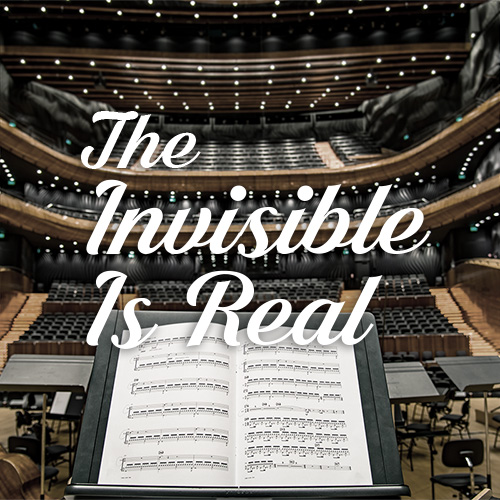The Invisible Is Real

In this series, “Grieve to the Gospel”—we invite you to share with us together in the truths of the good news of Christ. We can tune our grief to the tones, notes, and chords we hear in it. We will still certainly grieve, but welcoming the gospel into our minds, hearts, and experience will help us to understand what the Bible means when it communicates that there is a uniquely Christian way to grieve (1 Thessalonians 4:13).
 After my daughter went home to glory, I went back to my home here on earth—and all of the time I had experienced with her while she was in the womb, felt invisible. I went home with no proof that she had been on this earth at all. I’m still missing that proof—her—and this still provokes tears as I type.
After my daughter went home to glory, I went back to my home here on earth—and all of the time I had experienced with her while she was in the womb, felt invisible. I went home with no proof that she had been on this earth at all. I’m still missing that proof—her—and this still provokes tears as I type.
I miss her. My comfort has not come by her absence no longer giving sorrow to my spirit. Missing her has punctuated the reality that this world is fading away—I experienced my daughter fading away far sooner than expected, and shockingly without warning. But the whole earth is passing away. I am passing away.
Yet, there is a “song” I hear that holds a clearer and truer pitch than anything this earth can produce. The song I hear with clarity is, brilliantly, of another place, another kingdom. It’s an expansive and sweeping melody telling me that I am not in the most “real” place; she is in the place that does not fade away.
Christ has inaugurated a new kingdom. It’s presently invisible to us; it’s not of this world. But, oh, it’s real.
An Invisible, Real Kingdom
In John 6:55, Jesus says that His flesh is real food and His blood is real drink. He speaks in terms of salvation being a meal—of Himself. Jesus became physical flesh and blood to give of His own body for our sins. But He is speaking beyond His physical incarnation here; Jesus teaches us that the most real meal we could have here on earth is actually spiritual.
The kingdom that Jesus came to inaugurate with us is one that directly corresponds to the real, spiritual salvation that He gives. Robert D. Culver wrote that, “The Kingdom is God’s kingship working salvation.”[1] This salvation will allow us to live on the last day, and it starts in us now what lasts.
“I am the living bread that came down from heaven. If anyone eats of this bread, he will live forever.”
John 6:51
And only this salvation is what allows us to live on the last day.
“Whoever believes in Him is not condemned, but whoever does not believe is condemned already, because he has not believed in the name of the only Son of God.”
John 3:18
Jesus was here to herald a spiritual salvation from the righteous wrath of God we were due, a salvation through the sacrifice of Himself.
By God’s grace, I have the hope that my daughter belongs to His salvation because, though she was sinful in nature from birth (1 Corinthians 15:22) and completely in need of Christ, she was also without the accountability of being able to grasp God’s general revelation in the world around her (Romans 1:20). So, I have the hope that God covers her in Christ.
When I felt a void in coming home from the hospital with no proof of my daughter, at the same time, she felt belonging. Even though—because she was stillborn—she never received a certificate of birth stating that she belonged to this country, I have this hope that she belongs to His kingdom.
“Therefore let us be grateful for receiving a kingdom that cannot be shaken”
Hebrews 12:28a
Though you and I do not presently see the fulfillment of our salvation—we are not yet in heaven—we can know the reality from Jesus that His kingdom is real.
Believing in More than Good Works and Heaven
Yet, the kingdom is not only future, but it has also already started in some sense (Mark 1:15; 2 Corinthians 6:2b; c.f. John 18:36). In order to know we will enter the kingdom in the future, we must be a part of it before the last moment of our lives on this earth.
How do we go about believing in Jesus’ salvation and belonging to His kingdom today? To help us, we can think about what it does not mean to believe. It does not mean we merely hope in heaven itself or that we try to live a moral life to reach heaven.
“Truly, truly, I say to you, you are seeking Me, not because you saw signs, but because you ate your fill of the loaves.”
John 6:26
The comforts of heaven are a true blessing after loss. But we cannot eat our fill of the incredible comforts of heaven alone to be there in the end. Desiring heaven and believing it exists are not enough—just like being [what we consider] decently good people is not enough.
What is? Jesus was asked that same question.
“‘What must we do, to be doing the works of God?’ Jesus answered them, ‘This is the work of God, that you believe in Him whom He has sent.’”
John 6:29
What can we do to earn heaven, if just believing in heaven is not enough? Jesus says it’s a misguided question. There is nothing we can do to merit heaven.
The work of meriting heaven is accomplished for the believer solely through Jesus Christ. In John 6, we can see that Jesus is God from heaven, and that He is eternal, sinless, better and more real than this world, satisfying, life, and salvation. Outside of Him there is no kingdom, no salvation, and no hope. Jesus gave Himself for those who would come to Him wanting to be free—confessing they sorrowfully deserve condemnation for their sin instead of heaven, humbly laying themselves down to believe His finished sacrifice for their sins, and claiming Him as Lord of their lives forever. By believing in Him, you receive a blessed Master, unending satisfaction, and an eternal hope. Those who believe His salvation and belong to His kingdom now are blessed.
“Jesus said to him, ‘Have you believed because you have seen Me? Blessed are those who have not seen and yet have believed.’”
John 20:29
As believers, we have eaten the meal that lasts forever, become part of the eternal song of the Lamb that transcends everything we experience here, and have unshakable hope that the kingdom of Christ will one day overcome everything dark and painful about this existence.
Today, we live between these two worlds with the blessed hope that what is invisible is real.
Tuning Your Grief to the Kingdom
Grieve to the tones and notes of the gospel:
- the eternal hope that your child’s invisibility to you means belonging for him or her in Christ’s kingdom
- the knowledge that Jesus Christ and His salvation are more real than this earth
- the King and kingdom that are unshakeable even though presently unseen
- the gift that you don’t merely have available to you the hope of heaven in the abstract; you have Christ who is Himself your Lord, your meal of satisfaction and sustenance, and your real hope (John 6:35)
Blessed are you, believer, for tuning your hearts to spiritual realities in the face of earthly devastation.
Blessed are you, believer, for trusting Jesus that your sins that once kept you from Him are completely forgiven through His death—resolving your greatest need.
Blessed are you, believer, for believing that in the fullness of time, His fullness of salvation and kingdom glory will not disappoint you.
Blessed are you to believe in the One you do not see.
And if you have not yet, perhaps you are more ready now than ever to believe in the Jesus you do not see with your eyes because you certainly know, in your soul, how real is the child you no longer see with your eyes. You know that what is real has to be beyond this life. Jesus has spoken into the void and said that this world is not all there is.
“We look not to the things that are seen but to the things that are unseen”
2 Corinthians 4:18a
[1] Hesselgrave, David J. Paradigms in Conflict: 10 Key Questions in Christian Missions Today. Grand Rapids, MI: Kregel Publications, 2005.
- Lianna
Hope Mom to Noelle Lianna belongs to her Lord. She is wed to Tyler and mother of two girls, one who lives in heaven and one who lives on earth. You’ll find her serving with Hope Mommies as Content Director and contributing to Of Larks and Unlocking the Bible.
Lianna belongs to her Lord. She is wed to Tyler and mother of two girls, one who lives in heaven and one who lives on earth. You’ll find her serving with Hope Mommies as Content Director and contributing to Of Larks and Unlocking the Bible.
Are you a writer who would like to join the blog team? Learn more and apply here.
Widget not in any sidebars


Got something to say?